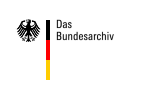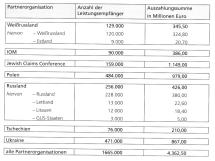
Portal on Forced Labour in the National Socialist State
zur Hauptnavigation zum Servicemenü direkt zum Inhalt
Partner Organisations
The so-called "Partner organisations" of the foundation were not foundation bodies but independent establishments in the countries of those concerned. In Eastern Europe these became the reconciliation foundations, which had been set up between 1991 and 1998 in association with the bilateral compensation agreements. Being internationally operating partner organisations the Conference on Jewish Material Claims Against Germany (JCC) represented Jewish beneficiaries and the International Organization for Migration (IOM) represented all other claimants, who did not reside in Eastern Europe resp. resided in a country which failed to have any national partner organisation. The seven partner organisations are:
- Conference on Jewish Material Claims Against Germany (JCC)
- International Organization for Migration (IOM)
- Foundation "Polnisch-Deutsche Aussöhnung"
- Foundation "Understanding and Reconciliation" (Russia)
- Foundation " Understanding and Reconciliation " (Ukraine)
- Foundation " Understanding and Reconciliation " (Belarus)
- German-Czech Future Fund
All of these partner organisations received an amount (ceiling), which they were supposed to allocate amongst all beneficiaries in their field of responsibility. The German Foundation Law of the Foundation "Remembrance, Responsibility and Future“ and the criteria defined therein formed the basis for the allocation. The endowment depended on the number of eligible victims of National Socialism estimates, which was estimated by historians, survivors’ associations and governmental institutions. Subsequently, it turned out that the ceilings of most of the partner organisations had been well funded. According to the criteria laid down, only 900,000 persons were amongst those eligible for payment whereas a total number of 1.1 million had been estimated. As a result, more money was available to be allocated in category C. At the end of the day, just under 1.7 million forced labourers were able to receive financial support that way.

Ceilings of Partner Organisations
Source: "Gemeinsame Verantwortung und moralische Pflicht". Published by Michael Jansen and Günter Saathoff. Göttingen, 2007. P. 215
The partner organisations formed the backbone of the entire payout process. Their staff were in direct contact with the victims. They spoke the same language and knew about their particular problems especially when anybody had a hard time producing any evidence with respect to genuinely having been deployed as a forced labourer. Staff of partner organisations were in many cases the first humans former forced labourers confided in and whom they told their individual story. The value of the psychological work, which was provided in the application receiving office by listening and talking to them, can barely be overestimated. Since they had been fearing reprisals, many of the people concerned had never spoken to any human about their past. Former forced labourers and prisoners of war were generally suspected of having collaborated with the Germans and that suspicion had long been fueled by the government.
The responsibility of partner organisations included making payout programmes known amongst those concerned, accept their applications, review them, check eligibility for benefits and then assure a correct payout. They were being monitored by the foundation, which had to had to make sure that partner organisations were acting in accordance with the legal requirements meaning German law and not their own national law when deciding on the notions. The application processing office was also in a close dialogue with the foundation EVZ.
